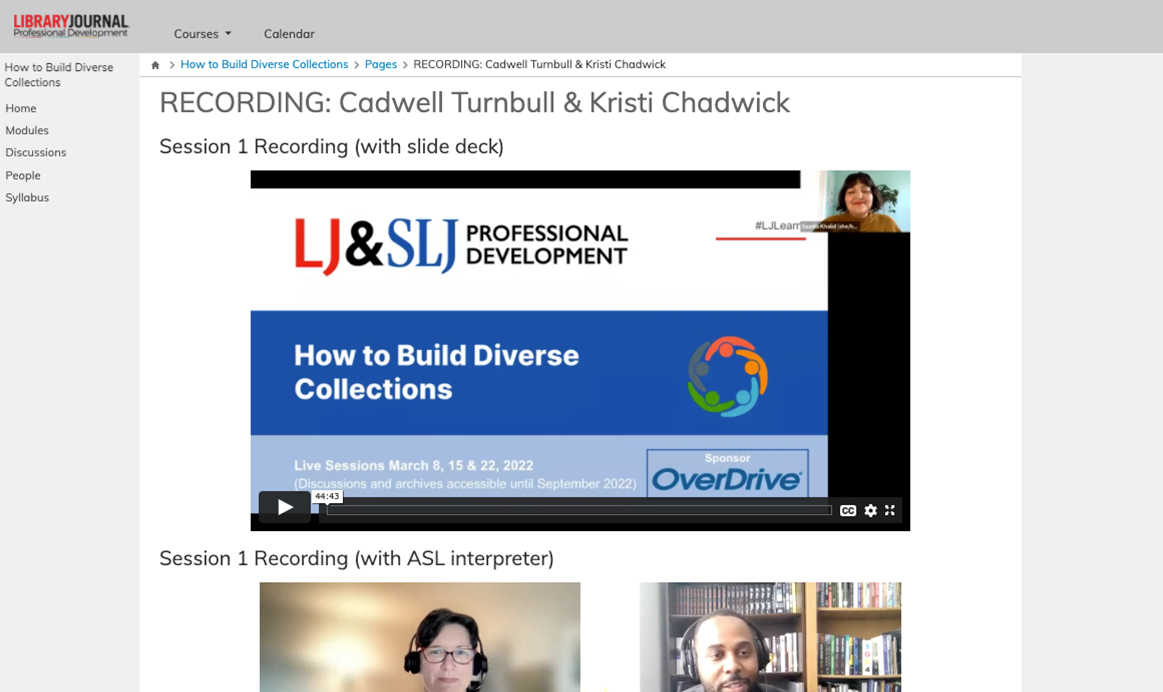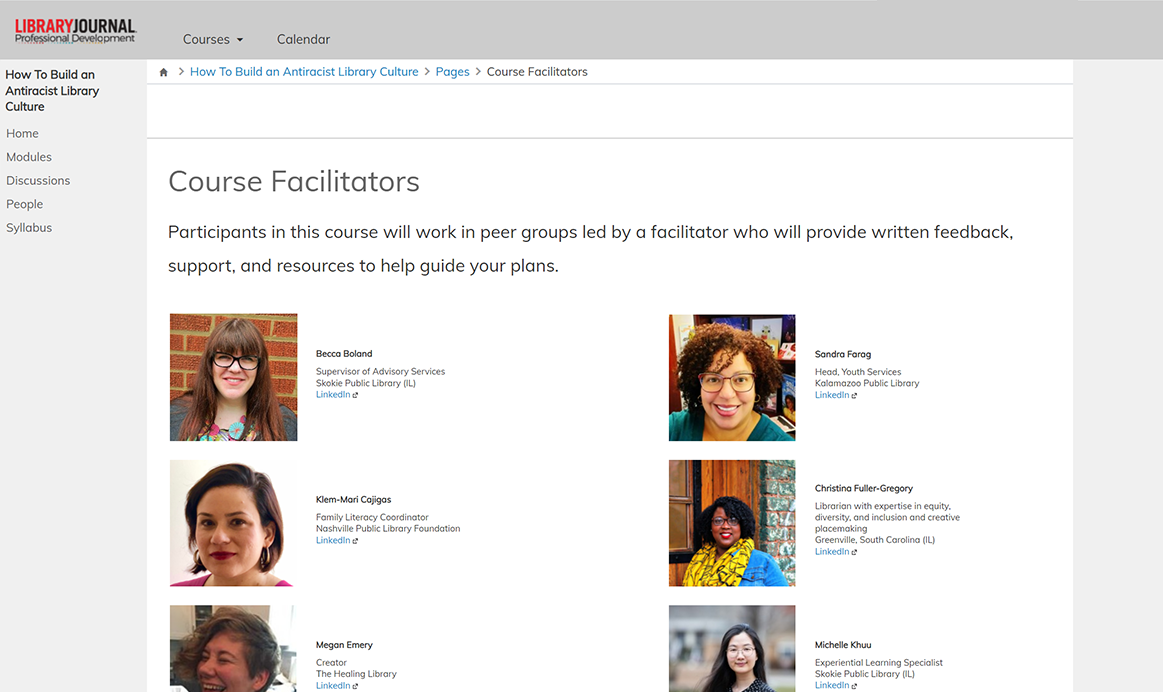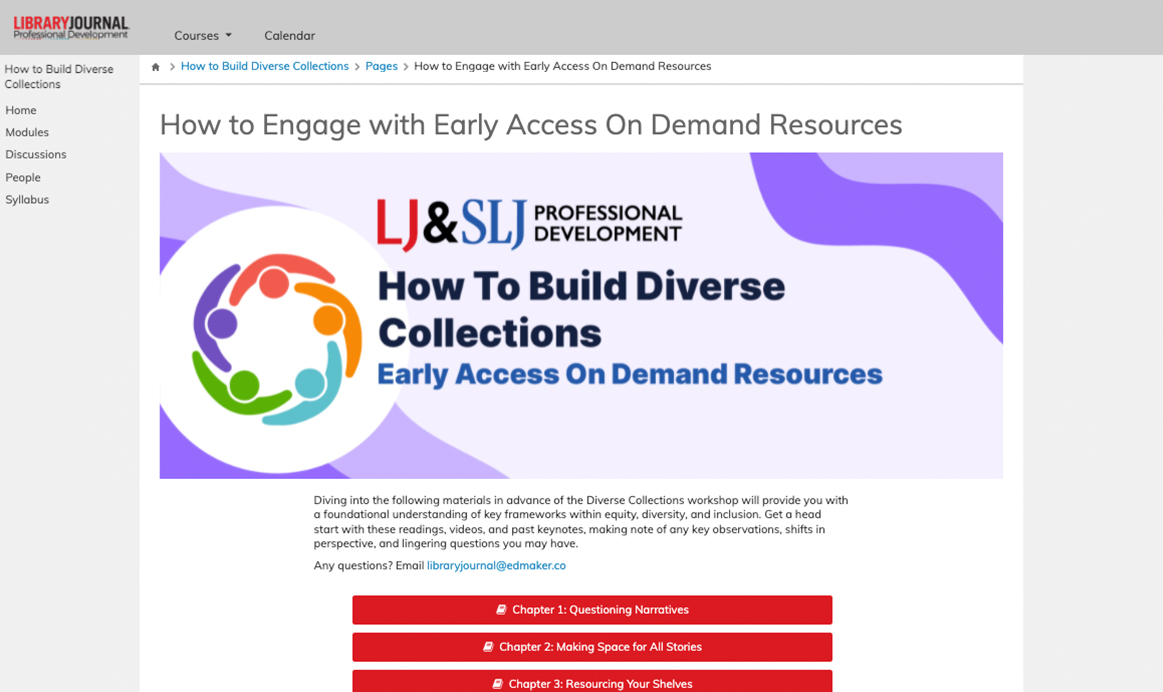Empowering Library Users with AI

Learn new developments and practical ways to help library users engage with AI tools. Check out the companion course Foundations of Integrating AI in Libraries to continue your learning.
Course Description
Live sessions via Zoom:
Wednesday, May 28, 2025 from 12:00 to 4:50 pm ET
(recordings accessible for 6 months)
Asynchronous Workshop:
Project-based assignments with expert feedback over 3 weeks
This online course will primarily focus on using AI with and for your community. We will discuss the pros and cons of engaging with AI, new developments in generative AI, as well as possible ways to integrate AI into your library programs. We’ll take a deep dive into how to teach AI to patrons and students, and you’ll leave with ideas for developing AI learning content for your library users. All live speaker presentations will be recorded and available on demand for six months.
This course includes one half-day (four hours) of live, online presentations from an expert speaker, as well as three weeks of a guided asynchronous workshop with facilitated peer cohorts and assignments. In this workshop, you’ll have the opportunity to practice what you’ve learned through prompted activities, share and crowdsource issues with peers, and get feedback from peers and your facilitator.
The live sessions run on Wednesday, May 28, 2025 from 12:00 to 4:50 pm (recorded for on demand viewing) with an asynchronous workshop over 3 weeks. Don’t miss this opportunity!
See full pricing details below. Get our best rates when you register a group of 3 or more!
When you sign up early, you’ll have immediate access to our Early Access On-Demand Resources—a series of webinars from past Library Journal and School Library Journal courses—to explore at your own pace
Learning Outcomes
After you attend this course, you’ll be able to:
-
Evaluate the ethical concerns about using AI and discern if and how to use it in your library
-
Teach AI tools to library users
-
Understand what types of research tasks AI is good for and which programs to use
-
Use AI to help library users conduct research
-
Employ fact-checking best practices when using AI with library users
-
Gain ideas for AI programming in your library
-
Help library users discern mis- and disinformation from AI
Who should take this course?
This course is for people with at least foundational knowledge about AI; it is open to all levels and types of library staff, but it will be most relevant to librarians who are involved with programs, services, or instruction.
Course Features
This is an online course with a half-day of live, online speaker presentations and an asynchronous 3-week workshop and will include:
-
Live sessions: Guest speaker presentations by leaders in their field. (All sessions are recorded for on demand access for six months after the course ends.)
-
Facilitated discussions: Audience participation in Q&A and discussion with guest speakers.
-
Asynchronous workshop: Project-based weekly assignments to connect what you’re learning to your professional life. Includes written feedback from an expert in the field who functions as the workshop facilitator, as well as peer conversation via discussion forums.
-
Early access on-demand resources: Access to a series of past live session archives from Library Journal and School Library Journal courses to explore at your own pace.
-
Online Classroom: The virtual learning platform that holds all course content and is accessible for six months after the course ends.
Course Advisor
|
|
Nicole Hennig is an expert in instructional design, user experience, and emerging technologies. She is currently an e-learning developer and AI education specialist at the University of Arizona Libraries. Previously, she worked for the MIT Libraries as head of the user experience department. In her 14 years of experience at MIT, she won awards for innovation and worked to keep academics up to date with the best new technologies. She is the author of several books, including Keeping Up with Emerging Technologies, Apps for Librarians, and Privacy & Security Online. Librarians who take her courses are applying what they’ve learned in their communities. See their testimonials. To stay current with the latest developments in AI, sign up for her email newsletter, Generative AI News, and follow her on Bluesky or Mastodon, where she posts daily about libraries, artificial intelligence, and other technologies. |
Expected time commitment
If you attend or watch the recordings of all live sessions and participate fully in the asynchronous workshop, you'll spend approximately 4 hours per week on this course. You'll earn 12 hours of PD credit and a Library Journal certificate of completion.
On-demand access
All live guest speaker sessions are recorded and available on-demand for six months following the initial broadcast as a part of your purchase.
Certificate of completion
Complete the course and earn 12 professional development credit hours. We provide a certificate that is emailed to you.
Accessibility
All guest speaker sessions feature auto captioning and are made available on demand after the initial broadcast. Please email libraryjournal@edmaker.co upon registration if you require any special accommodations and we will make our best efforts to facilitate them.
Support
For support with online courses, please contact libraryjournal@edmaker.co.
Pricing
Discounted rates are available for a limited time only. Secure your tickets now to lock in the best price.
|
Rate |
Early Bird |
Advance |
Standard |
|---|---|---|---|
|
Deadline |
April 9, 2025 |
May 14, 2025 |
May 28, 2025 |
|
Ticket Price |
$239 |
$261 |
$284 |
Group Rates
We offer discounts for groups of 3 or more. Groups have the option to collaborate in the same workshop group, where discussions and project-based assignments receive feedback from an experienced librarian.
For larger groups of 15 or more, we offer the option to apply group rates across multiple courses to receive significant discounts. For more information, select “Bulk Course Credits Packages” in the form below.
By registering for this event you confirm that you have read and agree to our Code of Conduct.
Half-Day Online Course + 3-Week Workshop
Wednesday, May 28
Course & Workshop Introduction | 12:00-12:20 pm ET
An introduction to the weekly assignments, an overview of what to expect from the online workshop in this course, and a chance to complete the course pre-assessment.
Session 1 | 12:20-1:00 pm ET
AI and Libraries: Pros, Cons, Ethics, and Misconceptions
AI likely isn’t going anywhere, so what is the library’s responsibility to engage with it and teach library users how to use it? What are the climate and ethical considerations? And what are ways we might address these considerations while still meeting patron needs? This introductory session will provide an overview of the current AI landscape and address the pros and cons to consider as you decide if and how to integrate AI into your library programs.
Speaker:

Sharesly Rodriguez, Artificial Intelligence (AI) Librarian, San José State University
Session 2 | 1:00-1:45 pm ET
AI and Library Users: Teaching Relevant Tools
How and where should you start teaching library users how to use AI? What tools should you focus on, and what kinds of materials or trainings should you consider creating? This session will explore options for using AI with patrons and teaching them relevant tools.
Speaker:

Brian Pichman, Director of Strategic Innovation at Evolve Project
Break | 1:45-2:00 pm ET
Session 3 | 2:00-2:45 pm ET
AI and Research: Supporting Library Users’ Research Practices
How can AI support users’ research needs? What types of tasks is AI good for, and what other skills will users need to know to complete their research? This session will give you ideas for how to use AI with students and patrons for doing library research. We will explore tools such as Copilot and Perplexity that you can use with students and patrons to aid their research practices, and we’ll cover the importance of fact-checking with tips for best practices.
Speaker:

Elissa Malespina, High School Librarian and Author of The AI School Librarians Newsletter
Session 4 | 2:45-3:45 pm ET
AI and Library Programs: Innovative Approaches
How are libraries using AI in their community programs? What are innovative and cost effective ideas that can be replicated at libraries regardless of size and budget? This session will explore AI programs that have proven successful in libraries. Leave with ideas for how to replicate and implement similar programs in your organization.
Speakers:


Crystal Trice, CSM, CSM@Scale, Library Consultant, Scissors & Glue, LLC
Thomas Finley, Adult Services Manager for the Frisco Library
Break | 3:45-4:00 pm ET
Session 5 | 4:00-4:45 pm ET
AI and Misinformation: Helping Library Users Discern Reality
How can libraries help their users discern fact from fiction when AI is involved? What is the role of the library to educate their community on mis- and disinformation without having a dedicated class or professor to do so? This closing session will discuss how to approach media literacy and discernment with all types of library users, from students to the general public. Leave with ideas for how to help educate your community and build information literacy and resilience.
Speaker:

Mary Ton, Assistant Professor and Digital Humanities Librarian, University of Illinois Urbana-Champaign
Photo credit - Robb Cohen Photography Company
Closing Remarks | 4:45-4:50 pm ET
Online Course Preview
A preview of how we build your library skills and bring inspiration to your projects with our online learning experience.
Course Format
One-Week Timeline (Course Runs 3+ Weeks)
|
DAYS 1-2 On-Demand |
DAY 3 4 hours |
DAYS 4-7 1-2 hours (optional) |
 |
 |
 |
|
PRE-LIVE SESSION - Resources - Discussions - Bonus Content |
LIVE SESSIONS - Guest speakers via webcast - Facilitated discussions - Recordings available for 6 months |
ASYNCHRONOUS WORKSHOP - Project-based weekly assignments - Written feedback from a facilitator - Peer conversation via discussion forums |
Course Features

Live session with Andrea Blackman and Tasneem Ansariyah Grace |
Live Guest Speakers Sessions
|

Recordings of guest speakers |
Recordings Available On Demand
|

Asynchronous workshop |
Online Classroom + Asynchronous Workshop
|

Early Access On-Demand Resources |
Early Access On-Demand Resources
|
ALREADY A SUBSCRIBER? LOG IN
We are currently offering this content for free. Sign up now to activate your personal profile, where you can save articles for future viewing





